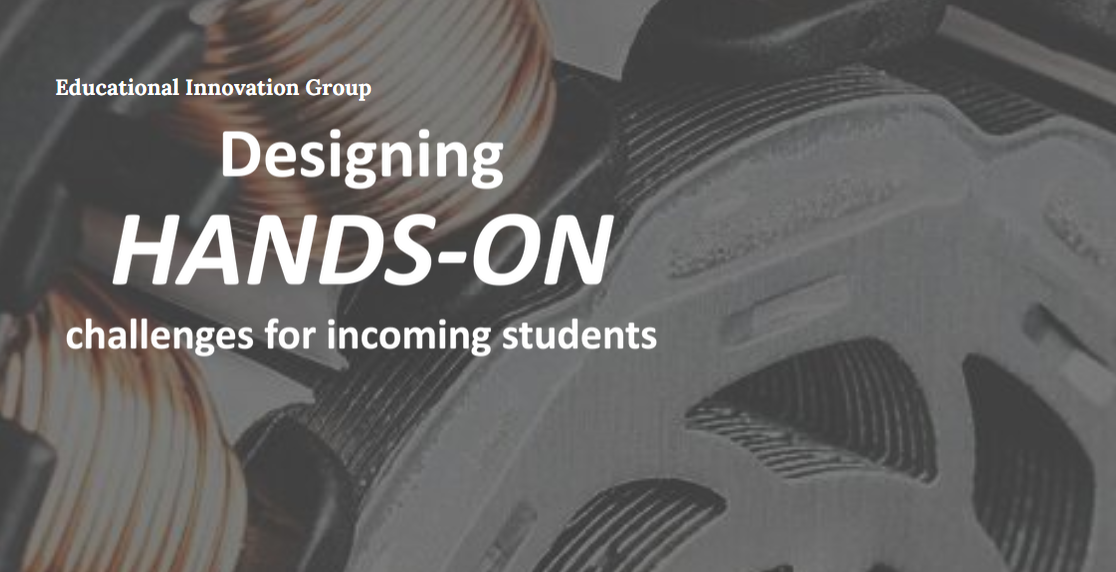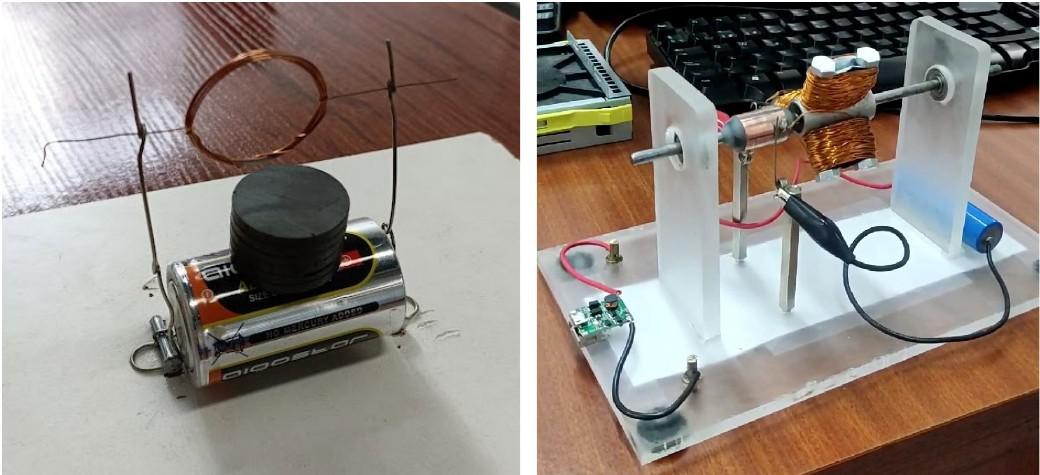Transforming university physics education: The challenge of building to learn
Transforming university physics education: The challenge of building to learn
Authors: Moisés Díaz, Associate professor Department of Physics, University of Las Palmas de Gran Canaria (DP-ULPGC) and DeTIC; Pedro Jesús Rodríguez De Rivera Socorro, Assistant professor, DP-ULPGC; María Dolores Pérez Hernández, Assistant professor, DP-ULPGC and IOCAG.

Physics, a cornerstone of engineering and science degrees, often becomes a daunting hurdle for many first-year students. Abstract concepts like Ohm’s Law or Lorentz Force, essential for any student, are frequently perceived as distant and disconnected from real-world applications. This classic challenge (physics courses being among the hardest) plays a significant role in academic failure and dropout rates.
Recent studies highlight that the lack of connection between theory and practical application leads to student demotivation, particularly during the first year 1. At this critical stage, expectations about their chosen field often clash with the reality of studying basic and abstract subjects like physics or mathematics. To address this issue, the CHALLENGINE project, spearheaded by the two public universities in the Canary Islands, aims to revolutionize physics learning through an innovative approach combining gamification, flipped classrooms, and hands-on learning 2.
Physics and university dropout rates: a critical problem
The first year of university is a decisive period in students’ academic lives. However, general physics, a foundational course in most engineering degrees, often becomes a formidable obstacle. The numbers speak for themselves: physics courses are infamous for high failure and dropout rates. According to the U-Ranking report, dropout rates in science-related degrees hover around 31%, significantly higher than in fields like Law (24%) or Health Sciences (15%). In Architecture and Engineering, the figure reaches a staggering 66%.
The reasons are manifold, but one key factor is the perception that the concepts taught are abstract and disconnected from future professional applications. Coupled with the technical complexity and lack of meaningful practical experiences, this perception often triggers a downward spiral of demotivation 3. Students begin to question the relevance of the knowledge they are acquiring, leading to negative attitudes toward the course and, in some cases, their entire degree. This can ultimately result in university dropout.
CHALLENGINE: A creative and innovative solution
In response to this situation, CHALLENGINE offers an innovative solution: connecting students with real-world technical and professional contexts from their very first year through a practical challenge-based project. In this case, students are tasked with designing and building a functional electric motor, applying the basic principles of electromagnetism 4.
The project integrates three key methodologies:
-
Flipped Classroom: Students first access audiovisual materials specifically designed to explain the theoretical concepts and tools needed for the project. This phase allows them to acquire foundational knowledge autonomously and at their own pace.
-
Project-Based Learning (PBL): Working in teams, students create a real prototype using accessible materials and the university’s physics lab facilities. This approach fosters active learning, collaboration, and problem-solving skills.
-
Gamification: The project culminates in a competition where a jury evaluates the prototypes based on criteria such as functionality, innovation, and presentation. The best designs are awarded prizes, adding a layer of motivation and excitement to the process.
Pilot experiences
This innovative project has been in development over the past two years. During the 2022–2023 and 2023–2024 academic years, we conducted two pilot experiences resembling the competition described earlier, but with virtually no rules, to evaluate student engagement and outcomes.
In the first year, several teams participated, constructing 11 motors, most of which operated successfully. In the second year, participation decreased slightly, but the quality of the motors improved significantly. Figure 1 shows the winning motors from the 2022–2023 and 2023–2024 academic years.
Additionally, the Canary Islands branch of Prysmian Cables Spain S.A.U. actively supported one of these courses by sponsoring prizes for the top two motors. These experiences demonstrate that this initiative is highly likely to succeed, inspiring confidence in its potential to revolutionize the teaching of physics.

Breaking barriers and motivating students
CHALLENGINE’s impact goes beyond improving academic performance. By addressing a practical and tangible problem, students develop a sense of achievement and satisfaction rarely experienced in traditional classrooms. Building something with their own hands allows them to see first-hand how theoretical concepts transform into useful tools for solving real-world challenges.
Moreover, the team dynamic fosters essential soft skills like communication, creativity, and time management – competencies that are crucial in the professional world. This approach, aligned with the trends of Education 4.0, aims to prepare future engineers for the demands of a rapidly changing world.
A replicable and sustainable model
CHALLENGINE is not only designed to transform education in the Canary Islands, but is also exportable to universities worldwide. The necessary materials are affordable and accessible, making it easy to implement in various educational contexts. Furthermore, its interdisciplinary nature allows it to be adapted to other subjects and degrees, broadening its scope and potential impact.
Sustainability is another key pillar of the project. Materials and resources are updated annually based on the results achieved, ensuring the initiative evolves and remains relevant. Collaboration with local businesses is also encouraged, strengthening ties between universities and the industrial sector.
A solution with a bright future
CHALLENGINE is already being piloted at the University of Las Palmas de Gran Canaria, and initial results are promising. In the coming years, the methodology is expected to expand to other universities, demonstrating that teaching physics can be practical, engaging, and effective.
University education urgently needs innovative solutions to tackle the challenges of the 21st century. Projects like CHALLENGINE show that it is possible to transform traditionally difficult subjects into meaningful and exciting learning experiences. After all, it’s not just about building electric motors—it’s about building more motivated, skilled, and well-prepared professionals for a complex world.
Can you imagine learning physics this way? CHALLENGINE is already making a difference, and its impact could be the beginning of a much larger change in how we teach and learn. It is available here.
References
- Nicoleta, Litoiu & Oproiu, Gabriela (2018) Dropout rate in universities – A critical issue of today education. The 14th International Scientific Conference eLearning and Software for Education. 2018. 77-83. Doi: 10.12753/2066-026X-18-152. ↩
- Nguyen, H. B. N., Hong, J. C., Chen, M. L., Ye, J. N., & Tsai, C. R. (2021) Relationship between students’ hands-on making self-efficacy, perceived value, cooperative attitude and competition preparedness in joining an iSTEAM contest. Research in Science & Technological Education doi: 10.1080/02635143.2021.1895100 ↩
- Brooker, A., Brooker, S., & Lawrence, J. (2017) First year students’ perceptions of their difficulties. Student Success doi: 10.5204/ssj.v8i1.352 ↩
- A. Sapena-Baño, J. Burriel-Valencia, R. Puche-Panadero, M. Pineda-Sanchez and J. Martinez-Roman (2022) Introducing Project Based Learning for Teaching and Learning Electrical Drives: A case of UPV 2022 IEEE Global Engineering Education Conference (EDUCON), Tunis, Tunisia doi: 10.1109/EDUCON52537.2022.9766641 ↩